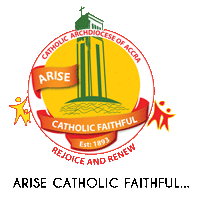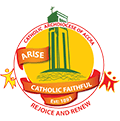
2015 CHRISTMAS AND NEW YEAR MESSAGE TO GHANAIANS FROM THE GHANA CATHOLIC BISHOPS’ CONFERENCE (GCBC)
May the grace and peace of Our Lord Jesus Christ be with you all!
My dear fellow Ghanaians, as we get ready to celebrate the feast of Christmas and New Year, I would like to share some reflections with you on the implications of the message of Christmas for our lives as Ghanaians.
Christmas and the Need for Peace
Christmas celebrates the birth of Christ, the Prince of Peace. For us Christians, Christ is the Prince of Peace spoken of by the prophet Isaiah (Isaiah 9:6). At Christ’s birth, the angels spoke of peace: “Glory to God in the highest, and on earth peace among men with whom he is pleased!” (Lk. 2:14). Christ, the Prince of Peace, gives his peace to this world in the Gospel of John: “Peace I leave with you; my peace I give to you; not as the world gives do I give to you” (John 14:27).
It is more than two thousand years since Christ left us physically for heaven, yet the peace that he spoke of remains an elusive phenomenon in our world today. We live in a world beset by all kinds of problems, including wars, even in the Middle East, the birthplace of the Prince of Peace.
But peace is not necessarily the absence of war. In many countries, including our own, there is no war, and yet there is no peace in homes and in families. There is no peace between brothers and sisters, between parents and children, between husbands and wives. There is no peace between rival political parties. As we celebrate the birth of the Prince of Peace, we should remember that there is the need for us to strive to make peace a reality and not a mere dream.
A Major Obstacle to Peace: Corruption
If we wish to enjoy the peace brought by Christ, the Prince of Peace, then in the coming year we will need to tackle corruption, which is a major obstacle to peace. We cannot have peace in the country when we are engulfed by corruption. In this connection, I would like to go back to the view expressed by the Catholic Bishops in their Communique issued at the end of their Plenary Assembly in Sunyani in November 2013: “‘The love of money is the root of all evils and there are some who, pursuing it have wandered away from the faith..’ (1 Tim 6:10). This admonition of the Apostle Paul has a timely relevance for our Ghanaian society today. Money has taken the centre stage in all aspects of our life and this is having a telling effect on our society…The desire to make quick money and by whatever means possible is bringing a huge social cost and untold suffering to the poor and vulnerable in our midst. It is in this light that we note with sadness the growing inequalities in our society fueled by corruption and other forms of malfeasance in recent times”.
This admonition by the Bishops is as relevant today as it was in 2013. The love of money has given rise to unbridled corruption in our society. Corruption is found in different strata of our Ghanaian society. In this message, we shall give a few examples of this social canker.
Political corruption occurs when, in the attempt to pay back monies received from the sponsors of their electoral campaigns, politicians circumvent laid down procedures for awarding contracts or breach the tender protocols in government procurement. Corruption can also take place in the electoral process when illegal means are used to secure votes.
As the investigations of Anas Aremeyaw Anas and his Tiger Eye PI team have shown, some members of the judiciary are corrupt, allowing themselves to be influenced in their judgment by monetary considerations. Police corruption occurs when, instead of arresting offending drivers, some police officers let such people go for a fee. It is not uncommon to see our police personnel “shaking hands” with drivers at police barriers. Corruption also occurs in the Driver and Vehicle Licensing Authority (DVLA) when many vehicles with all sorts of mechanical problems receive roadworthy licences from the DVLA when bribes are paid.
There is corruption also in some of our academic institutions. Today, in some instances, if one wants one’s daughter or son to get into a prestigious senior high school, one must be prepared in some cases to pay a bribe. The Computerised School Selection and Placement System (CSSPS) was supposed to put an end to corruption in the admission of students to our schools. However, as the Bishops noted in their November 2015 Communique, this type of corruption continues in “a computer, programmed by a prone-to-corruption human being” who chooses schools for our students. In the senior high schools, universities and other tertiary institutions, some male lecturers offer inflated grades to female students in exchange for sex.
There is corruption also in the workplace. In Ghana today, if a young and beautiful girl goes to look for a job, she may be lucky to be offered the job without ending up in bed with the potential male employer. There are people working in offices who want bribes before they offer their services to those who go there seeking assistance.
There is corruption also in the marketplace. Corruption takes place when pharmacists and others sell fake drugs on the market and when they intentionally sell expired drugs. Corruption takes place when certain types of traditional medicines that claim to be a panacea for all illnesses are sold to a gullible and ignorant public, wreaking a lot of havoc on them. Corruption takes place at the filling stations when petrol or diesel, adulterated with kerosene or some other stuff, is sold to customers.
There is corruption also in the media. Some media practitioners become corrupt when they take money from some people or political parties to disseminate news that is untrue and which even has the potential to heighten tensions among Ghanaians. Media practitioners, both state and private, should aim at being fair, honest, objective and circumspect in their coverage and reportage.
Corruption can also be found in sports. If the allegations of the bribing of referees and players in our local football competitions are true, then they will be good examples of corruption which should be investigated.
Chieftaincy is a sacred and revered institution in our country, and our chiefs are considered custodians and repositories of traditional wisdom. However, some chiefs of late are bringing the chieftaincy institution into disrepute by the excessive love of money. Some of them can sell the same plot of land to two or more people, and this often results in endless litigation. Such a practice constitutes corruption and should be condemned.
The practice of religion has sometimes been tainted with corruption. This happens when some of its practitioners see it as a means of getting money. Some religious leaders seem to be in the ministry primarily for money. For this reason, they use all sorts of means to extort money from the congregation. Sometimes they take advantage of their gullibility and extort monies from them. Some churches do not feel obliged to render accounts to their members. This is fertile ground for corruption. Some men of God today betray the confidence reposed in them by their flock. Some women in their congregations sometimes go to them trusting that, through them, they will find solutions to their problems, whether temporal or spiritual. However, some of them betray this confidence by making advances towards the women and having sexual relations with them. This also constitutes corruption.
The message of the Bishops’ Conference to all Ghanaians is that corruption, no matter where it occurs, is evil and its practice will not bring peace to Ghanaians. We should therefore endeavour to put an end to it. If there is corruption, it is largely because people are not acting with integrity wherever they are. Let us all try to put an end to corruption so that we can enjoy the peace that Christ has given to us.
In conclusion, it is the prayer of the Bishops’ Conference that Christ, the Prince of Peace, who brought joy during the first Christmas to Mary, Joseph, the shepherds and the angels, will bring you joy and peace. It is also our prayer that the coming year will be filled with joy and peace for each and every one of you as you endeavour to serve the Lord. May the joy of the first Christmas and of this Christmas be in your hearts always and may you forever share in the peace of Christ, the Prince of Peace.
On behalf of the Ghana Catholic Bishops’ Conference, I wish you all a happy Christmas and a blessed New Year!
FROM:
MOST REV. JOSEPH OSEI-BONSU,
PRESIDENT, GHANA CATHOLIC BISHOPS’ CONFERENCE,
AND BISHOP OF KONONGO-MAMPONG.

